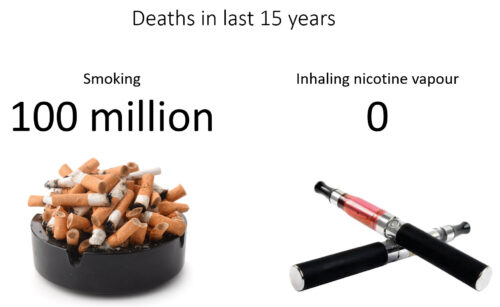
Is vaping safer than smoking?
Posted on February 27, 2022 By Colin
In spite of what you may read in the media, vaping is now established to be a far safer alternative to smoking. This webinar I gave recently at the National Drug and Alcohol Research Centre at the University of New South Wales summarises the scientific evidence on nicotine and vaping and addresses the popular misconceptions.
Nicotine
Nicotine is addictive but relatively benign. It does not cause cancer or lung disease and only has a minor role in heart disease. Here is what leading health organisations say about nicotine:
| Royal College of Physicians, UK | ‘Use of nicotine alone, in the doses used by smokers, represents little if any hazard to the user’ |
| UK Royal Society for Public Health | ‘Tobacco contains nicotine along with many other chemicals, but nicotine by itself is fairly harmless’ |
| Public Health England | ‘Nicotine use per se represents minimal risk of serious harm to physical health’ |
| New Zealand Ministry of Health | ‘For people who smoke, nicotine itself is low harm’ |
| National Health Service, UK | ‘While nicotine is the addictive substance in cigarettes, it is relatively harmless’ |
Long-term use of nicotine has not been found to cause any significant health effects.
There is no evidence that nicotine harms the human adolescent brain. Reports of harm are based on rat and mouse studies.
The positive effects of nicotine include
- Pleasure, reward (from dopamine)
- Improves concentration, alertness, memory
- Calming effect and improved mood
- Weight control
- Schizophrenia
- Neuroprotective: Parkinson’s disease; ?Alzheimer’s disease
- Ulcerative colitis; ADHD; Increases pain threshold
Is vaping safer than smoking?
Leading health organisations have assessed the evidence and concluded that vaping is not risk-free but is far less harmful than smoking
| Royal College of Physicians, UK | Vaping is at least 95% less risky than smoking |
| Public Health England | Vaping is at least 95% less risky than smoking |
| NASEM (US) | Vaping is ‘likely to be far less harmful’ than smoking |
| NZ Ministry of Health | Vaping is ‘not harmless, but it is much less harmful than smoking’ |
| Health Canada | ‘Vaping is less harmful than smoking’ |
| Committee on Toxicity, UK | ‘the relative risk … expected to be substantially lower’ |
Update September 2022
A comprehensive (1,400 page) systematic review commissioned by England's Office for Health Improvement and Disparities concluded that
- "vaping poses only a small fraction of the risks of smoking", and that
- "the 'at least 95% less harmful' estimate remains broadly accurate, at least over short term and medium term periods"
This is because most of the harmful chemicals in smoke are absent from vapour. Those present are in much lower levels than in smoke.
Levels of toxins detected in the urine and blood of smokers (biomarkers) reduce dramatically when they switch to vaping.
After switching, breathing improves asthma, and emphysema get much better and lung infections reduce. The risk of heart attack declines and blood pressure falls.
The risk of cancer from vaping has been estimated to be 0.4% of the risk of smoking.
There is no identified harm from passive vaping.
Popcorn lung is a myth. There has never been a case of popcorn lung from vaping or smoking.
The outbreak of serious lung disease and deaths in North America in 2019-20 was due to THC vaping oils contaminated with Vitamin E Acetate, not due to nicotine vaping.
Although the precise long term risks of vaping nicotine have not yet been established they are certain to be only a tiny fraction of those from smoking, which kills prematurely up to 2 in 3 long-term users.
There is very little research on vaping in pregnancy but the evidence in adult smokers suggests it is likely to be significantly less harmful than smoking

Based on this information, the estimate that vaping is 95% safer than smoker is a very reasonable guide.